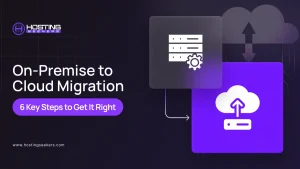
Advantages of Cloud Infrastructure
Cloud Industry Updated on : November 13, 2024Introduction
The scalable and dynamic cloud computing environment provides infinite benefit that increase flexibility, efficiency, and overall success. In this blog post, we will explore the key advantages of cloud infrastructure and how it transforms business operations. Let’s begin by understanding the cloud infrastructure.
Table of Content
What is cloud infrastructure?
Cloud infrastructure can be defined as the software and hardware resources required to offer cloud computing services. This infrastructure typically consists of storage, servers, network equipment, and software components.
A cloud service provider generally operates and owns a Cloud infrastructure. It is utilized to offer a wide range of services that incorporate infrastructure as service (IaaS), platform as a service (PaaS), and software. It is typically accessed via the internet and can be utilized by organizations of all sizes to access computing resources as needed rather than maintaining and building their own infrastructure.
Types of Cloud Infrastructure

1. Public Cloud Infrastructure
Public cloud infrastructure is operated and owned by third-party cloud Service providers like Microsoft Azure, Amazon Web Services (AWS), and Google Cloud Platform (GCP). It offers access to computing resources like storage, virtual machines, and networking. Public cloud infrastructure services are cost-effective and highly scalable, as businesses pay only for the resources they utilize on a pay-as -you go basis.
2. Private Cloud infrastructure
As the name suggests, private infrastructure is dedicated to a single company and is mainly hosted either on-premises or by a third-party provider. It provides personalization, customizations, and security compared to public cloud solutions, making it ideal for organizations with stringent compliance requirements or sensitive data.
Also, the private cloud infrastructure components enables businesses to leverage cloud computing benefits while maintaining full ownership and control over their resources. It can be placed by utilizing virtualization technologies like OpenStack, Microsoft Hyper-v, vSphere or through managed private cloud services offered by cloud.
3. Hybrid Cloud infrastructure
Hybrid cloud infrastructure components combines elements of public and private cloud environments, enabling businesses to leverage the benefits of both models. It allows seamless integration and workload portability between on-premises infrastructure and public cloud services.
Also, an organization can dynamically allocate workloads depending on factors like performance, security, cost, and compliance requirements. Moreover, hybrid cloud solutions offer scalability, and flexibility, allowing businesses to optimize their infrastructure investments and IT resources.
4. Multi-cloud Infrastructure
This type of cloud-based infrastructure services uses multiple public cloud providers to host different workloads and applications. It enables companies to avoid vendor obstacles and get the best services from various cloud providers.
Multi-cloud infrastructure also offers resilience and redundancy by categorizing workloads across multiple cloud platforms. It needs robust management capabilities to make sure seamless security, integration, and performance across different environments.
5. Community Cloud Infrastructure
Community cloud infrastructure is shared by several organizations with the same interests as industry-specific standards, regulatory compliance needs and more. It provides a collaborative platform for organizations within the same community to share resources, applications, and data while maintaining data compliance. Mostly, its solutions are utilized in sectors like government, healthcare, and finance, where strict regulatory needs and data privacy cover come to light.
Advantages of Cloud Infrastructure

Cloud infrastructure offers a variety of benefits that make things easy for you. As it offers a strong cloud server that contains all the data storage without having trouble to store data in different servers and file systems.
1. Ensure Scalability and Flexibility
Opting cloud computing has a significant impact on how an organization can deploy and optimize its resources. For start-ups, delegating all IT-related tasks to a third-party expert frees up significant resources that can be utilized to achieve business goals. Also, most importantly, an in-house IT setup simply does not offer the flexibility in features and software capabilities that a business need. As every start-up needs rise and utilizing cloud computing enables them to seamlessly scale their IT capabilities and meet business growing requirements.
2. Better Automation
While if you are opting for in-house IT infrastructure, you may require a dedicated IT team to oversee, handle, and manage all IT operations. This team is also in charge of integrating changes or upgrades to the existing infrastructure. As it’s very expensive, and time-consuming, cloud computing is the better alternative.
As the applications are automatically optimized on the cloud, Cloud-based Infrastructure services also handle and maintain server to make sure that it performs smoothly. This results in increased level of automation liberates a significant number of resources that your start-up can utilize for expansion and growth on a financial level.
3. Securing your Data
Securing you data is the paramount due to rising numbers of cyberthreats. Cloud computing servers are the popular target for cyber threats. A security solution that aids in protecting sensitive data and business transactions has been made available by the cloud. This helps in maintaining the data safe from third parties or other data transmissions violations.
4. Disaster Recovery
No one can guarantee your downtime, as any kind of downtime can be disastrous for business in today’s highly competitive market, as every company or start up needs to alert for any kind of worst scenarios. You may need to make strategic investments in tools and knowledge if you need to enable disaster restoration and recovery of your IT services. In contrast, Cloud solutions providers offer clients with comprehensive affordable cloud disaster recover solutions.
5. Regular Software Updates
Cloud offers regular software updates so that you need to wait for a computer specialist. All the cloud-based apps have been created and designed to automatically update and refresh themselves. These apps update automatically, so you don’t have to wait, which will hamper your work, especially when you don’t have any time to update it physically.
6. Cost-effective
Cloud computing provides cost advantages due to its pay-per-use model. Unlike traditional computing services with fixed subscriptions plans, cloud services also enable users to pay only for the resources they utilize. This includes application services and hardware platforms, making it cheaper.
Also, users have the flexibility to choose the services they require and make payments based on their usage. This pay-as-you-go approach enables users to be not overcharged and can afford costs by scaling resources as per their requirements. In simple terms, with cloud computing, you pay for what you use, making it a cost-effective solution for businesses.
7. Maintenance and Management
Cloud Computing offers more advanced and efficient management services and offers enhanced maintenance, which helps the users enjoy a modified user interface without installing resources. This makes it easy to maintain and manage your data without any interruptions.
Conclusion
This cloud infrastructure offers more advanced and constructive use of resources that helps businesses grow for the long term in improved collaboration, production, and security, utilizing shared resources and maintaining an effective communication method.
FAQs (Frequently Asked Questions)
Q 1. What is cloud infrastructure?
Ans. Cloud infrastructure refers to the collection of computing resources that includes storage, servers, software, and networking, delivered over the internet.
Q 2. How does cloud infrastructure provide cost-efficiency?
Ans. Cloud infrastructure follows a pay-as-you-go model, which means organizations only pay for the resources they utilize. This eliminates the need for upfront investments in hardware and software that minimizes maintenance costs.
Q 3. How do cloud infrastructure solutions support remote work?
Ans. Cloud infrastructure solutions allow remote access to applications and data from any demographic, all you need is just an internet connection.
Q 4. Does cloud infrastructure protect sensitive data?
Ans. Yes, Its includes advanced security measures like identity, access, encryption, and continuous monitoring.
Q 5. How does cloud infrastructure contribute to business innovation?
Ans. Yes, cloud offers access to a variety of cutting-edge technologies and services, including big data analytics, artificial intelligence, machine learning, and IoT platforms.




